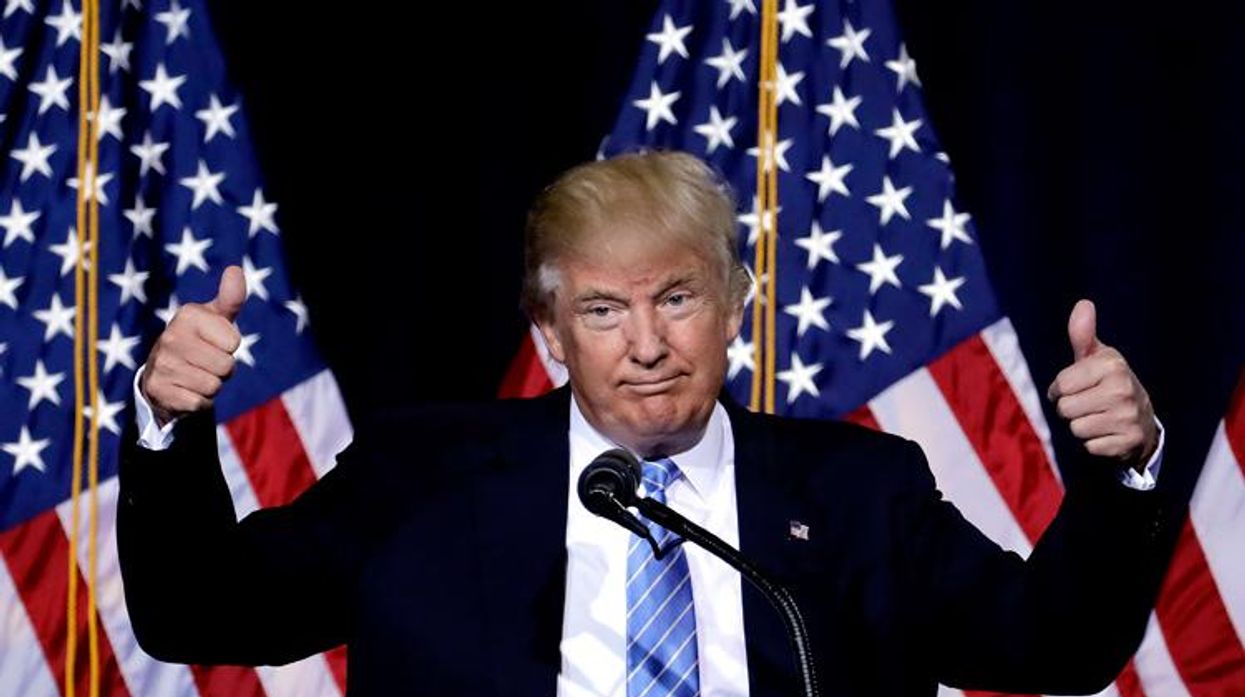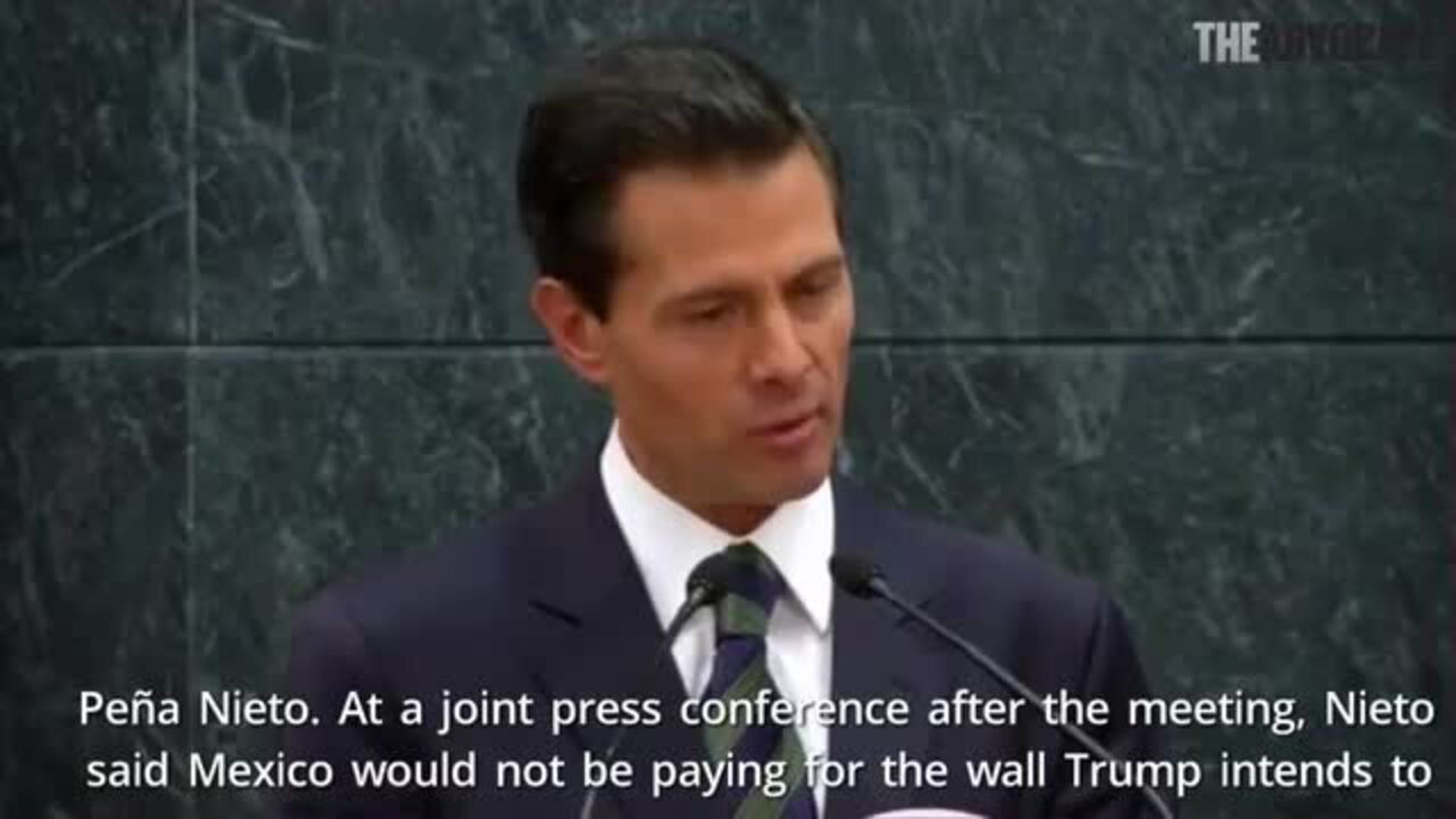At one point during Donald Trump's long-awaited speech about immigration Wednesday, the candidate warned the audience that a "dangerous criminal alien" might be standing right behind them.
"We have them all over the place," he said. "Probably a couple in this room, as a matter of fact, but I hope not."
That was essentially the theme of the speech, that criminal immigrants are hiding in plain sight, and they're all around you.
He repeatedly claimed President Obama had stopped local police from deporting criminals -- a theory he has no evidence to support.
"We will terminate the Obama administration's deadly, and it is deadly, nonenforcement policies that allow thousands of criminal aliens to freely roam our streets, walk around, do whatever they want to do, crime all over the place," he promised.
Obama has actually deported more people than any president in history, earning him the nickname from some immigration activists as "deporter-in-chief." In recent years, Obama prioritized deporting people who'd committed crimes. So it's unclear why Trump believes authorities weren't "allowed" to deport them before.
"The local police who know every one of these criminals, and they know each and every one by name, by crime, where they live, they will work so fast," he said later in the speech. "And our local police will be so happy that they don't have to be abused by these thugs anymore. There's no great mystery to it, they've put up with it for years, and now finally we will turn the tables and law enforcement and our police will be allowed to clear up this dangerous and threatening mess."
Trump is simultaneously floating the possibility there are more criminals out there than anyone estimates, suggesting the government had lost track of how many illegal immigrants might be lurking.
"It's always 11 million," he said of estimates. "Our government has no idea. It could be 3 million. It could be 30 million. They have no idea what the number is."
The speech, delivered in Arizona, began by listing stories of Americans being gruesomely murdered or sexually assaulted, sometimes in their homes, by immigrants. In one story, a 64-year-old woman gets raped and then "beaten to death with a hammer." It ended after Trump invited to the stage "angel moms" -- a term for parents who've lost children, but it's now being redefined by the alt-right as parents who've lost children at the hands of immigrants.
The phrase doesn't appear to have been widely used before Wednesday, except for on the website Breitbart, which his new campaign chairman, Steve Bannon, is on leave from operating. The alt-right site first mentioned "angel moms" June 22, when one such mom thanked Trump for publicly reading a letter she'd sent. It came up again July 22 when the "angel moms" protested House Speaker Paul Ryan as he sought reelection.
Remember that Trump criticized a "gold star" mother, Ghazala Khan, who lost her son in combat fighting for the United States. Trump suggested the mother hadn't spoken onstage at the Democratic National Convention with her husband because she's Muslim, but Khan said it was because the pain of losing a son was too great to talk about.
The Khans had objected to Trump's plan to bar Muslims from entering the country, and even in this most recent immigration policy speech, Trump reiterated that idea. He emphasized his call for "extreme vetting" that poses questions about ideology to Muslims from countries such as Syria and Libya. Whether anyone can pass that test depends greatly on who does the asking, Trump said.
"If we have the right people doing it," Trump said Wednesday, "believe me, very, very few will slip through the cracks."
The immigration plan Trump outlined Wednesday included 10 main points. Some lack of clarity about his immigration policy was addressed, with Trump reiterating that he does indeed plan to create a "deportation task force" that's "focused on identifying and quickly removing the most dangerous criminal illegal immigrants in America who have evaded justice."
"Just like Hillary Clinton has evaded justice, OK?" he said. "Maybe they'll be able to deport her."
But his case for immigration reform was by and large based on his portrayal of Mexicans as criminal, uneducated, drags on American society.
The president of the National Council of La Raza, Janet Murguia, said after the speech that "Donald Trump doubled down on an immigration platform that continues to be based on falsehoods, distortions and dog whistles culled directly from the most extreme elements of the anti-immigrant movement."
Aside from being criminals, Trump said the problem with immigrants from Mexico is they're "lower-skilled workers with less education, who compete directly against vulnerable American workers." Specifically, he said these low-skilled, low-educated workers were taking jobs from African-Americans and Hispanics. That continues his tendency of falsely describing black voters as impoverished and unable to walk down the street without risk of being shot.
By contrast, he said Clinton "promises uncontrolled, low-skilled immigration that continues to reduce jobs and wages for American workers, and especially for African-American and Hispanic workers within our country. Our citizens."
Trump once again cited the racist Center for Immigration Studies to make his case. The group -- founded by eugenicist John Tanton -- got a nod in Trump's first big round of general election commercials. This time, Trump cited the center to claim that more than 60 percent of immigrant-led households draw upon welfare.
"Those who abuse our welfare system will be priorities for immediate removal," he said.
While the Statue of Liberty might say "Give me your tired, your poor, Your huddled masses yearning to breathe free," Trump has a new policy for immigration.
"We take anybody," he complained, "not anymore." Trump said "we need a system that serves our needs, not the needs of others."
Learn more about the Center for Immigration Studies here:





































































Charlie Kirk DID say stoning gay people was the 'perfect law' — and these other heinous quotes